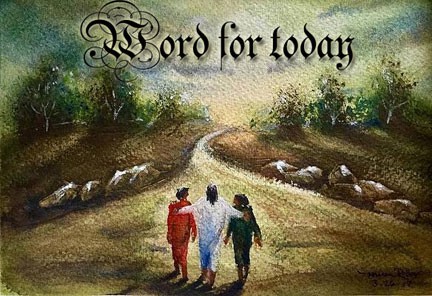Watch
Events
Articles
Market
More
061925
WORD FOR TODAY “is Israel and America being set up for a Trojan horse?”: Jos 8:4 He instructed them, "You are to lie in wait to ambush the city from behind. Stay close to the city; and all of you, be ready.
WISDOM FOR TODAY: Pro 29:25 The fear of man brings a snare, But he who trusts in the LORD will be exalted.
www.BGMCTV.org




Exactly when the Christian church began to teach the return of Jesus is something to look forward to is unclear. That doctrine is most likely founded on a misunderstanding of Matthew 24 especially verse 30, “At that time the sign of the Son of Man will appear in heaven, and all the tribes of the earth will mourn. They will see the Son of Man coming on the clouds of heaven with power and great glory.” Overlooking the surrounding verses gives the illusion of a could rider that we see in much of the artwork that depicts this. But even in this verse we see the people will mourn because they will finally understand what is happening.



Thought for Today: Thursday June 19
Our Adonai regards His followers as a select company who belongs to a different world from the rest of humanity. Many people in Yeshua’s day, were worldly and unspiritual, publicly parading their religion to impress others while privately dominated by pride, ambition, greed, and falsehood. Yeshua told His disciples they could not make their light shine by sinking to a worlds level. It was only by abiding in the Moshiach and living under the ruling power of His Ruach Kodesh that they could rise above the world. Only in that way could they be the Salt and Light to a decaying darkened world.



A Book Review that is a Messianic Classic: https://thekingdomnetwork.us/2....025/06/11/book-revie



Please read this week's SPECIAL bulletin for First Fruits Ministries upcoming Sabbath celebration, which has significant news that you don't want to miss about this coming Shabbat: https://firstfruits.cc/blog/20....25/06/18/special-sab



Wonderful Teachings & Ancient Biblical Oils/Resin
https://www.facebook.com/share..../r/1GqKFZQvuj/?mibex



And Jesus, looking at him, loved him, and said to him, “You lack one thing: go, sell all that you have and give to the poor, and you will have treasure in heaven; and come, follow me.”
Mark 10:21
Whatever the faults of this rich man, Jesus saw him and loved him for his obedience and his desire to please God. The problem wasn't that he was rich, but that he might value his riches over his relationship with God.



We
e in Oklahoma!
Triumph In Truth ministries is in Oklahoma! Our desire is to host a Shabbat gathering this weekend near Oklahoma City and next weekend near Tulsa. Details about where and when will be upcoming. Please verify that you would like to be water-immersed or attend a gathering. We look forward to seeing you soon! info@triumphintruth.global
https://triumphintruth.global/thevisionhome


